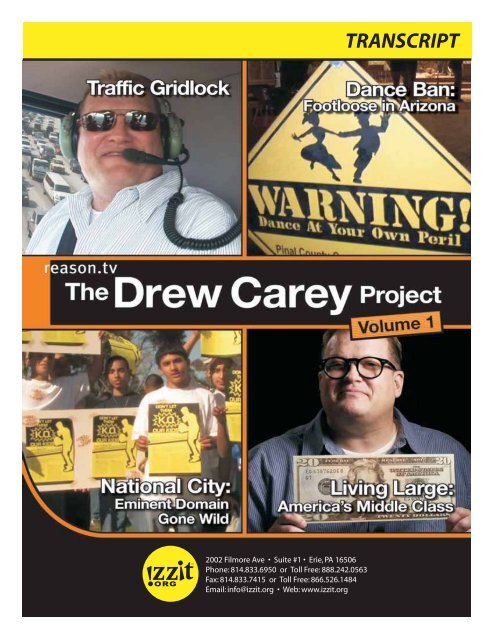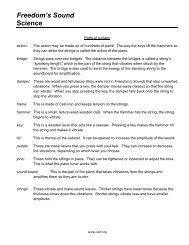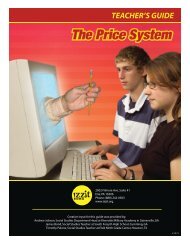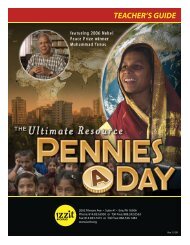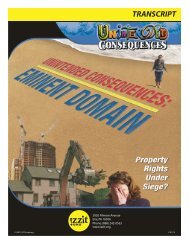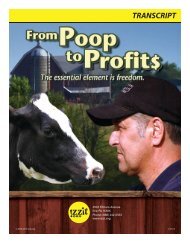The Drew Carey Project Volume 1 - Izzit.org
The Drew Carey Project Volume 1 - Izzit.org
The Drew Carey Project Volume 1 - Izzit.org
You also want an ePaper? Increase the reach of your titles
YUMPU automatically turns print PDFs into web optimized ePapers that Google loves.
2002 Filmore Ave • Suite #1 • Erie, PA 16506<br />
Phone: 814.833.6950 or Toll Free: 888.242.0563<br />
Fax: 814.833.7415 or Toll Free: 866.526.1484<br />
Email: info@izzit.<strong>org</strong> • Web: www.izzit.<strong>org</strong><br />
TRANSCRIPT
<strong>The</strong> <strong>Drew</strong> <strong>Carey</strong> <strong>Project</strong>, <strong>Volume</strong> 1<br />
Transcript<br />
For a list of additional resources to use with this video go to<br />
www.izzit.<strong>org</strong>/products and click on the <strong>The</strong> <strong>Drew</strong> <strong>Carey</strong> <strong>Project</strong>, <strong>Volume</strong> 1 video.<br />
For reason.tv: Gridlock<br />
<strong>Drew</strong> <strong>Carey</strong>: Hi, I’m <strong>Drew</strong> <strong>Carey</strong>, here at the corner of Sunset and Highland in Los Angeles, California,<br />
one of the worst intersections in all of Los Angeles. It’s only a quarter after 4:00. <strong>The</strong>y already have a<br />
traffic cop in the middle of the intersection directing traffic. He’s here all the time. <strong>The</strong> traffic goes all<br />
the way back in each direction blocks and blocks. <strong>The</strong>re’s no end in sight to it. Los Angeles, along with<br />
a lot of other cities like Portland, San Francisco, Minneapolis, you know, traffic is the #1 concern, the #1<br />
complaint among the people that live here and like a lot of places in America, it’s only going to get worse.<br />
So, you live in LA, right?<br />
Male Resident 1: I do.<br />
<strong>Drew</strong> <strong>Carey</strong>: And what do you think about the traffic here?<br />
Male Resident 1: It sucks.<br />
Male Resident 2: It’s disgusting.<br />
<strong>Drew</strong> <strong>Carey</strong>: Yeah. Everyone in LA complains about traffic but we didn’t want to talk too just anyone.<br />
We wanted to talk to the poor soul with the most congested commute in LA. We asked John and Ken<br />
from radio station KFI AM 640 for help.<br />
DJ John: So we teamed up with <strong>Drew</strong> and the Reason Foundation to start the Most Congested Commute<br />
here in the LA area.<br />
DJ Ken: Remember, not the longest commute. Those of you who have been stuck in a whole lot of<br />
traffic is what we’re looking for.<br />
<strong>Drew</strong> <strong>Carey</strong>: And you can’t have a car driving you there either. I don’t want to hear from Harvey<br />
Weinstein about how bad his commute is.<br />
DJ Ken: I hear people say this. <strong>The</strong> no. 1 reason they’d want to move out of LA…..<br />
DJ John: Traffic.<br />
DJ Ken: …..is the traffic<br />
<strong>Drew</strong> <strong>Carey</strong>: Yeah, but you guys like congestion because it keeps people listening to your radio.<br />
DJ John: Yeah. No, we freely admit that.<br />
2
<strong>Drew</strong> <strong>Carey</strong>: Well, we heard plenty of traffic sob stories and finally found our contest winner. Meet<br />
graphic artist Josh Lipking.<br />
Josh Lipking: I do this every morning. Check out Sig Alert, Google traffic.<br />
<strong>Drew</strong> <strong>Carey</strong>: Every day he kisses his wife goodbye—<br />
Josh Lipking: Love you, girl.<br />
Josh’s Wife: Love you, too. Bye—<br />
Josh Lipking: Have a good day.<br />
Josh’s Wife: You, too.<br />
<strong>Drew</strong> <strong>Carey</strong>: And drives into hell.<br />
Josh Lipking: That’s when, you know, you get this heart pumping in your chest. You start to sweat a<br />
little and just kind of bite the bullet and just go for it.<br />
<strong>Drew</strong> <strong>Carey</strong>: But he tries to make the most of the time he spends stuck in traffic.<br />
Josh Lipking: So, this is a great little tool, 1-hand flossier. And it’s slow enough where, you know,<br />
people are putting on their makeup, people are shaving. I had chicken for dinner last night.<br />
<strong>Drew</strong> <strong>Carey</strong>: You know, if you get tired of the traffic in LA you can always take the bus if you have a<br />
day and a half to get to work.<br />
Josh Lipking: Oh, I’ve used transit.<br />
<strong>Drew</strong> <strong>Carey</strong>: Josh actually gave his car away and he used public transit for over a year but it turned out<br />
the bus was even slower than driving.<br />
Josh Lipking: <strong>The</strong> transit out here is stuck in the traffic.<br />
<strong>Drew</strong> <strong>Carey</strong>: So Josh eventually bought another car. Josh lives only 16 miles from work but it often<br />
takes him an hour and a half to get to the office. At the end of the day, it’s the same fight to get back<br />
home - 3 hours a day! No one should have to live like this. We’ve got to find a way to speed up Josh’s<br />
commute.<br />
<strong>Drew</strong> <strong>Carey</strong>: What would you do about traffic if you were the king of Los Angeles?<br />
Male Resident 1: If I was the king of Los Angeles? Hmmm, well I think we’re pretty much screwed.<br />
<strong>Drew</strong> <strong>Carey</strong>: I’d make people use their gas pedal more and I’d make them pull all the way up to the<br />
bumper in front of them.<br />
<strong>Drew</strong> <strong>Carey</strong>: On the “John and Ken Show,” I suggested other ways to bust congestion, like letting<br />
private companies pay for roads.<br />
3
DJ Ken: Well, how would that help?<br />
<strong>Drew</strong> <strong>Carey</strong>: Well, first of all, taxpayers wouldn’t have to pay for the road. Like I was talking to<br />
somebody from the Reason Foundation at dinner and I go what do you think we should do about<br />
something like the 101 and he goes just double-decker it and I go “Who’s going to pay?” and he says,<br />
“Let a private company do it and they can charge people to ride on the road. You can get a Fast Pass and<br />
you pay 5-bucks.”<br />
DJ John: Sure, the top deck could be for the tolls.<br />
<strong>Drew</strong> <strong>Carey</strong>: Yes. And if you privatize it, you can have different companies bidding—I would love to<br />
own a freeway in LA<br />
DJ John: <strong>The</strong> <strong>Drew</strong> <strong>Carey</strong> Freeway?<br />
<strong>Drew</strong> <strong>Carey</strong>: Yeah—Maybe the <strong>Drew</strong> <strong>Carey</strong> Freeway would look something like this snazzy doubledecked<br />
toll road in Tampa, Florida or maybe I’d build my road underground. Here’s a tunnel that’s being<br />
built in Paris. Tunnels that run underneath Australian cities help people get around town. <strong>The</strong> private<br />
sector paid for all these.<br />
Josh Lipking: Life would be much happier without the congestion.<br />
<strong>Drew</strong> <strong>Carey</strong>: So, let’s build the Josh Lipking tunnel. Double-deck one of the freeways he uses or, hey,<br />
how about building some special express lanes like the one accountant Cedric Allen uses.<br />
Cedric Allen: Oh, this piece of paper - this is the billing statement for using the 91 Express Lane,168<br />
total trips valued at a cost of $548 which people see that and they’ll go, “WOW, you spend that much?”<br />
<strong>Drew</strong> <strong>Carey</strong>: <strong>The</strong> 91 Express Lanes isn’t your typical toll road. A private company built it in the middle<br />
of the 91 Freeway in Orange County, California. <strong>The</strong> express lanes run right next to the regular lanes so<br />
drivers can choose to use them or not and you don’t have to stop at toll booths. Tolls are collected<br />
electronically from this gadget that hangs overhead. When traffic gets bad the price of the toll rises. <strong>The</strong><br />
OCTA owns the 91 Express Lanes. Here’s spokesman Ted Nguyen.<br />
Ted Nguyen: <strong>The</strong> average toll is about $2.76. <strong>The</strong> low end is about $1.50 and the high end is about<br />
$9.50.<br />
<strong>Drew</strong> <strong>Carey</strong>: Sounds pricey but each day about 40,000 people pay the toll because the special lanes let<br />
them zoom past slow-moving traffic. Mailman Demetrius Mikes battles through congestion on his way<br />
home but once he hits the express lanes his commute speeds right up.<br />
Demetrius Mikes: To me it saves you about an hour and a half to two hours.<br />
<strong>Drew</strong> <strong>Carey</strong>: Traffic often keeps parents from picking up kids at day care on time. Imagine paying five<br />
bucks for each minute you’re late. Cedric knows all about that.<br />
Cedric Allen: On an average week we would probably spend about $40.00 per child times three. That’s<br />
$120.00 a week for being a few minutes late.<br />
4
<strong>Drew</strong> <strong>Carey</strong>: $120.00 a week. Once he started using the express lanes Cedric almost never had to pay<br />
late fees, so paying a little can end up saving you a lot of money and time.<br />
Demetrius Mikes: Oh, with the extra time I do my school work, you know, talk to my son, just time to<br />
relax.<br />
Cedric Allen: Have more time to prepare a decent meal. I have more time to spend with the family and<br />
possibly even get in a movie before going to bed at night.<br />
<strong>Drew</strong> <strong>Carey</strong>: Unpredictable traffic makes it hard for Josh to make plans even with his wife but with an<br />
express lane, he could always make it home in time for dinner.<br />
Josh Lipking: <strong>The</strong> 91 Toll Expressways—I think that’s a great idea.<br />
<strong>Drew</strong> <strong>Carey</strong>: So, let’s see. Express lanes, tunnels, double-deckers, anything else we could do to get Josh<br />
home fast?<br />
Male Resident 2: <strong>The</strong>re has to be some other ways to travel, like they should the use the air.<br />
<strong>Drew</strong> <strong>Carey</strong>: Use the air? Hmmm—<br />
<strong>Drew</strong> <strong>Carey</strong>: Hey man, I’m <strong>Drew</strong>. Nice to see you. How are you? Getting ready for the easiest way to<br />
work you ever had in your life?<br />
Josh Lipking: Yeah, let’s go for it.<br />
<strong>Drew</strong> <strong>Carey</strong>: Yeah, come on. Follow me.<br />
<strong>Drew</strong> <strong>Carey</strong>: Hope the helicopter doesn’t crash. <strong>The</strong> best words to show at my funeral though if it does.<br />
Josh Lipking: This is the way to go. I’ve got to get my stuff set up to do this every day.<br />
<strong>Drew</strong> <strong>Carey</strong>: Do traffic report.<br />
Josh Lipking: Ten (10) west bound looking slow. Josh Lipking, Traffic Copter 12 in the sky.<br />
Josh Lipking: So, that was a blast, huh?<br />
Josh Lipking: Yeah, exactly. Thanks.<br />
<strong>Drew</strong> <strong>Carey</strong>: At the end of the day, Josh rode the chopper back home. So long, 90-minute commute.<br />
Josh Lipking: My commute - only 9 minutes. I have no idea what it even looks like in my<br />
neighborhood at 5:00 p.m. I’m going to go inside, have some dinner with my wife. This is the greatest<br />
thing. Thanks a lot.<br />
<strong>Drew</strong> <strong>Carey</strong>: Such a happy ending or is it? We can’t keep flying Josh to work so it’s back to the<br />
gridlock grind for him first thing tomorrow. Now, we could build some express lanes, tunnels, and<br />
double-deckers. Taxpayers wouldn’t even have to pay for it. <strong>The</strong>n Josh, bus riders, and other commuters<br />
could escape congestion every day and, hey, if we could beat gridlock in LA, we could beat it anywhere,<br />
5
ut if you’ve live in Los Angeles as long as I have, you really shouldn’t have much hope. It’s okay,<br />
though, because I have a helicopter.<br />
For reason.tv, I’m <strong>Drew</strong> <strong>Carey</strong> and I’m out of here in a helicopter.<br />
Banner:<br />
<strong>Drew</strong> got home in 7 minutes.<br />
It took the crew 75 minutes.<br />
But who’s counting?<br />
6
For reason.tv: Living Large<br />
<strong>Drew</strong> <strong>Carey</strong>: Ah-h-h, isn’t life in America great? But maybe I’m just an out-of-touch rich guy. Wonder<br />
what it’s like for the middleclass in America?<br />
CNN Lou Dobbs: What’s left of our middle class may be on the verge of collapse.<br />
CNN New York Anchor Desk: <strong>The</strong> American dream is under siege.<br />
CNN Lou Dobbs: Corporate America posting record profits so why in the world are middleclass<br />
Americans suffering from declining pay and standards of living?<br />
<strong>Drew</strong> <strong>Carey</strong>: Well, that’s a good question, Lou. We headed to California’s Castaic Lake to confront<br />
some fat cats as they played around in the water with hardly a care in the world.<br />
Tourist: Ha, ha, ha.<br />
<strong>Drew</strong> <strong>Carey</strong>: Nothing but fast toys, Hummers and Escalades. Of course, their owners were happy to<br />
brag about them.<br />
Boat Owner 1: It’s a Yamaha. It’s a twin-engine high output.<br />
<strong>Drew</strong> <strong>Carey</strong>: Ever seen the price tag for a 27-foot boat?<br />
Boat Owner 3: Oh, it cost $50,000.<br />
Boat Owner 2: It’s a special boat like for wakeboarding.<br />
Male 2: Well, you need something to tow it, right? Ha Ha Ha.<br />
Boat Owner 2: Every day that they wake up, they believe that this day is going to be better than<br />
yesterday.<br />
<strong>Drew</strong> <strong>Carey</strong>: Yeah. Well, today is going to be better than yesterday if all you gotta to do today is go<br />
wakeboarding. This rich guy sees the world through rose-colored designer glasses, probably a trust fund<br />
kid who doesn’t even have a job.<br />
Interviewer Voice: What do you do for a living?<br />
Boat Owner 2: I’m a gardener.<br />
<strong>Drew</strong> <strong>Carey</strong>: A gardener? Well, this guy’s gotta be a fat cat CEO.<br />
Interviewer Voice: What’s your job?<br />
Boat Owner 3: I sell building materials.<br />
Interviewer Voice: So you must be like a corporate CEO or something, right, to support something like<br />
this?<br />
7
Boat Owner 1: Uh, no. Law Enforcement.<br />
<strong>Drew</strong> <strong>Carey</strong>: A cop with a big boat and a Hummer. Ah ha. Here’s an auto mechanic who must be<br />
struggling. He’s got no boat.<br />
Interviewer Voice: Yeah, do you have a boat like this or—<br />
Male 1: No. I have motorcycles.<br />
Interviewer Voice: Yeah. What kind of motorcycles do you have?<br />
Male 1: Oh, Hondas, Harleys, Suzuki. Got ‘em all.<br />
<strong>Drew</strong> <strong>Carey</strong>: <strong>The</strong> boat belongs to his buddy, a truck driver. How can guys with regular jobs afford all<br />
this? Maybe we just happened to visit the lake during the lottery winners’ reunion.<br />
Michael Cox: Well, that is America’s middleclass today. It’s amazing the amount of stuff they’re able to<br />
own and their consumption levels that they achieve today compared to the past.<br />
<strong>Drew</strong> <strong>Carey</strong>: Economist Michael Cox is co-author of Myths of Rich and Poor, Why We’re Better Off<br />
Than We Think. He says the middleclass is doing great but that’s not what we hear on TV.<br />
CNN Lou Dobbs Anchor 1: <strong>The</strong> problem is their wages are low, they…<br />
CNN Anchor 2: <strong>The</strong>y’re reeling from stagnant wages.<br />
Michael Cox: So many things wrong with that. First of all, those wages don’t include the benefits that<br />
we bargain for - we demand.<br />
<strong>Drew</strong> <strong>Carey</strong>: Even if you add in benefits, how much you earn is only part of the story. How much<br />
things cost. Now, that’s another important part.<br />
Michael Cox: Is the cost of everything going down? No. Is the cost of the vast array of things that<br />
Americans purchase going down? Absolutely.<br />
<strong>Drew</strong> <strong>Carey</strong>: What? That’s not what other people say.<br />
CNN Lou Dobbs Anchor 3: It’s dangerous. It’s a vicious, vicious cycle. Everything’s going up.<br />
<strong>Drew</strong> <strong>Carey</strong>: Money is how we usually measure the cost of living, but Cox things we should use<br />
something more important to us—our time.<br />
Michael Cox: Really, the best way to measure cost is in terms of work time. How long do I have to<br />
work in order to afford to buy something? So, let’s just take a product, for example, the cell phone.<br />
<strong>Drew</strong> <strong>Carey</strong>: <strong>The</strong> classic ’80s movie “Wall Street” takes us back to the early days of the cell phone<br />
when corporate big shots went cordless with their $4,200 bricks.<br />
Male Character of Movie: My wife tells me you made a move on Darien.<br />
8
<strong>Drew</strong> <strong>Carey</strong>: Few regular people could afford cell phones because the average worker had to sweat for<br />
460 hours to buy one. Boy, how times have changed.<br />
Michael Cox: So this $50.00 phone is less than 3-hours of work; 460 then, 3 now. Huge declines in<br />
prices enabling these things to be afforded by the middleclass and many other products, too.<br />
<strong>Drew</strong> <strong>Carey</strong>: Only the rich owned cars a century ago, but today average Americans can afford shiny<br />
SUVs. In terms of time, the cost of a car has fallen by more than 70%. <strong>The</strong> story is the same for<br />
necessities. Food is 84% cheaper. Clothing is 87% cheaper.<br />
Michael Cox: So food’s going down. Clothing is going down. Housing is going down in cost. We look<br />
at the houses and we see that they’re much more expensive in money terms, but the houses are also twoand-a-half<br />
times as large as back then and they have all the amenities.<br />
<strong>Drew</strong> <strong>Carey</strong>: Today, the typical new home comes equipped with a dishwasher, stove, microwave,<br />
fireplace, central heat and air and a bunch of other amenities that weren't standard in homes 50 years ago,<br />
let alone a century ago. <strong>The</strong> falling cost of living allows regular Joes to own boats, vacation at lakes and<br />
fly around the world. We checked it out. <strong>The</strong> cost of a cross-country flight has plummeted by 95%.<br />
Michael Cox: When the flights first came out, they were the exclusive purview of the rich, the jet set, but<br />
now the jet set includes just you get on planes and look, there’s people there of all income levels.<br />
<strong>Drew</strong> <strong>Carey</strong>: Such progress and yet so many middleclass Americans feel lousy.<br />
CNN News Reporter: And only 19% of middleclass Americans feel they are getting ahead in life.<br />
<strong>Drew</strong> <strong>Carey</strong>: Gee, I wonder why. Maybe they’d be in a better mood if news programs weren’t packed<br />
with doom and gloom but, you see, bad news gets ratings.<br />
4-Different Anchor Desks: whether they’ll ever have the kind of . . . all the days. . .<br />
<strong>Drew</strong> <strong>Carey</strong>: Remember the auto mechanic who collects motorcycles?<br />
Male 1: Works good. Plenty of it. Just got another raise. Everything is good.<br />
<strong>Drew</strong> <strong>Carey</strong>: Even folks who say things are going well for them are often convinced times are tough for<br />
everyone else.<br />
Male 1: Yeah. <strong>The</strong>re’s some big guys and then there’s the poor people and there’s really no middleclass<br />
anyway.<br />
Michael Cox: <strong>The</strong>se are things that they hear about propagated in the media.<br />
Male 1: I guess the middleclass is always getting squeezed.<br />
<strong>Drew</strong> <strong>Carey</strong>: Sure seems like he’s been watching a lot of TV.<br />
CBS Sunday Morning: …squeezed is what a lot of middleclass Americans are these days.<br />
9
CNN Anchor 4: …the middleclass squeeze.<br />
CBS Report Public Response: <strong>The</strong>re is a squeeze.<br />
<strong>Drew</strong> <strong>Carey</strong>: If middleclass folks aren’t getting squeezed, they’re told they’re victims of war.<br />
CNN Lou Dobbs: Corporate American escalating its war against the middleclass.<br />
<strong>Drew</strong> <strong>Carey</strong>: And it’s always more difficult to…<br />
CBS Report Public Response: …make ends meet.<br />
CNN Lou Dobbs: …make ends meet.<br />
CNN Report Public Response: It’s very, very difficult to make ends meet.<br />
Michael Cox: But if you’re willing to settle for a living standard of the 1970s, it’s easier to make ends<br />
meet. It’s not the high cost of living. It’s the cost of living high. It’s the fact that we insist on having so<br />
much more.<br />
<strong>Drew</strong> <strong>Carey</strong>: Too bad putting things in perspective is rarely considered newsworthy.<br />
CBS News Reporter: But today much of the American middleclass is struggling.<br />
<strong>Drew</strong> <strong>Carey</strong>: It’s much easier to stir up anxieties.<br />
CNN Reporter Report: <strong>The</strong> Iraq War may be Democratic voters’ top issue but economic anxiety comes<br />
next and…<br />
<strong>Drew</strong> <strong>Carey</strong>: And bad news doesn’t just get ratings. It also gets votes.<br />
CNN Report – Hillary Clinton’s Speaks: While productivity and corporate profits are up, the fruits of<br />
that success just hasn’t reached many of our families. It’s like trickle-down economics but without the<br />
trickle.<br />
Michael Cox: If your life is bad, it’s clearly cruel and unfair. Vote for me and I’ll help.<br />
<strong>Drew</strong> <strong>Carey</strong>: It’s a bipartisan theme.<br />
President Bush Speak: <strong>The</strong> fact that our dynamic economy is leaving working people behind…<br />
Michael Cox: <strong>The</strong>re are people suffering out there and there’re always been people suffering out there.<br />
<strong>The</strong>re will always be people suffering out there. <strong>The</strong> poor you’ll always have with you, but how does it<br />
compare to the past? Americans are richer today than in any time in history. We should really be<br />
thankful that we live in a society where we don’t have to work day and night in order just to be at a living.<br />
<strong>Drew</strong> <strong>Carey</strong>: We can spend more time with family and friends because it takes less time for us to buy<br />
the things we need, so if you look at it that way, the future will be even better than today. So, don’t<br />
worry. You’ll still be able to tell your kids how tough you had it compared to them.<br />
For reason.tv, I’m <strong>Drew</strong> <strong>Carey</strong>.<br />
10
For reason.tv: Dance Ban<br />
<strong>Drew</strong> <strong>Carey</strong>: Hi, I’m <strong>Drew</strong> <strong>Carey</strong>. I was in the moving “Robots” with Halle Berry. I’m Craig, the<br />
yellow robot, and Halle’s the cute silver robot. Halle Berry starred in “Bullworth” with Warren beatty<br />
who co-starred with Goldie Hawn in “Shampoo” who was in “First Wives Club” with Sarah Jessica<br />
Parker who was in “Footloose” with, you guessed it, Kevi<br />
Remember “Footloose”? It’s that film from the ’80s about high school kids fighting for the right to<br />
dance. Quaint, right? Well, believe it or not, we found our very own footloose story in the Arizona<br />
desert. Somehow they knew we were coming.<br />
Spencer Bell: Well, my name is Spencer Bell. I’m a junior at ASU. I’m going to the William P. <strong>Carey</strong><br />
School of Business for business management.<br />
Dale Bell: Well, my name is Dale Bell and I, along with my son, Spencer, built the San Tan Flat<br />
Steakhouse here in Queen Creek, Arizona.<br />
Spencer Bell: <strong>The</strong> idea for San Tan Flat kind of came along. My dad and I were driving in a car and my<br />
dad turned to me and said, “You know, Spencer, what do you want to do with your life? What do you<br />
want to do for a job or profession?” And I turned to him and I said, “Well, you know, I want to get into a<br />
business, a small business, where a Wal-Mart, Cosco, another big box store is not going to beat me up out<br />
of it.” He turned to me and said, “Well, the only business that I know of where you can do that is the<br />
restaurant business.”<br />
Dale Bell: When he suggested he’d like to go into small business I thought it’d be the perfect thing for<br />
him to learn a small business and the difficulties involved in that and be part of the American dream. We<br />
have one neighbor that actually lives on the property that joins our property and his name is Paul Younger<br />
and he’s a beekeeper. Paul initially was the only person who showed up in opposition to our rezoning.<br />
Paul Younger: I opposed it because of the lights and the noise and the smells and traffic and everything<br />
else I thought would be detrimental to our lifestyles here.<br />
Dale Bell: When we were approved (our plan was approved by the County Supervisors) we actually<br />
received a standing ovation.<br />
Paul Younger: When the meeting was over and it became obvious that he was going to get approval, I<br />
asked him to please have some consideration for the neighbors here and he assured me that he would.<br />
Spencer Bell: It was exciting - exciting to finally see the doors open.<br />
Paul Younger: I was really pleasantly surprised. <strong>The</strong> impact was very minimal and it’s been a<br />
convenience to have him close by.<br />
Dale Bell: When people would walk into the courtyard and see those bonfires and this atmosphere, this<br />
ambience, from all these old wagons and buggies and all the antiques that have been collected here, the<br />
word that most often was mentioned was ‘awesome.’ People would say this is awesome.<br />
11
<strong>Drew</strong> <strong>Carey</strong>: Dale and Spencer soon found out, however, that not everyone was excited to see San Tan<br />
Flat open.<br />
Dale Bell: We weren’t breaking any laws but Pinal County apparently decided that they did not like us<br />
and decided that they wanted to put a noise ordinance in, as they did have a neighbor complain about<br />
some of the noise, and they put one of the strictest in the state of Arizona. In fact, the sound of a sewing<br />
machine is louder than we are allowed to be with our country western music venue here.<br />
Paul Younger: Dale called and asked me if the music was too loud, if it was bothering me or anything<br />
else and I really hadn’t even noticed it that much.<br />
<strong>Drew</strong> <strong>Carey</strong>: In addition to the noise levels, the County hassled Dale and Spencer about everything,<br />
from the size of their parking lot to the number of signs along the road and the kind of wood they burned<br />
in their fire pits. Dale and Spencer’s efforts to comply cost them more than a hundred thousand dollars<br />
but County officials still weren’t satisfied. <strong>The</strong>y decided to invoke a 60-year-old ordinance.<br />
Dale Spencer: Dancing they said in Pinal County is illegal if it’s done outdoors.<br />
(Music: “<strong>The</strong>re’s an Arizona county where some taverns. . .”)<br />
<strong>Drew</strong> <strong>Carey</strong>: Based on the County’s ruling which Dale and Spencer are fighting in court, each day San<br />
Tan Flat patrons are caught dancing, Dale and Spencer must pay a $700.00 fine. Over the course of a<br />
year the fines would total more than two hundred thousand dollars.<br />
Dale Spencer: Well, there’s no logic behind why a government would not want to allow dancing that I<br />
can come up with.<br />
Male Patron 1: I think it’s ridiculous. Dancing is a natural God-given right.<br />
Female Patron 1: Dancing is so much fun.<br />
Female Patron 2: Why stop it?<br />
Female Patron 1: It’s good music. You might as well dance and have fun.<br />
Female Patron 3: All I have to say is, “Look at the crowd.”<br />
Male Patron 2: Dancing is part of life.<br />
Female Patron 4: I think that it is - It’s bad business as far as the County is concerned . . .<br />
(Music)<br />
Dale Spencer: We have - we’ve asked everyone, everyone that we know that might have a clue as to<br />
why Pinal County would attack this family-friendly good business and no one has been able to come up<br />
with a logical explanation.<br />
Paul Younger: Maybe someone is trying to use our County regulations to harass San Tan Flats into<br />
either submission or into some sort of a bankruptcy or financial situation where it has to be put on the<br />
12
market and sold and there are people around here with money that would probably be interested in buying<br />
it at a real cut rate.<br />
Dale Bell: Had it not been for the government’s assault upon this venue, this would’ve been a - just<br />
almost a dream come true for a small businessman because it was met with so much support and praise.<br />
Spencer Bell: Because of this experience I see how government can be so abusive of its power even on a<br />
small local level. It doesn’t have to be federal. Even our Pinal County government is just way overstepping<br />
their bounds.<br />
Dale Bell: <strong>The</strong>y’re going to have to take me on all the way to the Supreme Court of this state and<br />
wherever else we can go beyond that, if necessary, because I don’t believe the government has any right<br />
to tell people they can’t express themselves and they can’t dance. [Music: “liberty . . . “]<br />
<strong>Drew</strong> <strong>Carey</strong>: So if you ever find yourself in Arizona on the road between Phoenix and Tucson, swing on<br />
by San Tan Flat. I hear it’s a great place to dance.<br />
For reason.tv, I’m <strong>Drew</strong> <strong>Carey</strong>.<br />
(Music: “Yes, everywhere there’s freedom, there’s someone who wants to take it and in Arizona, it’s<br />
Pinal County…)<br />
Banner: Pinal County officials refused to comment on this case and declined our request for an<br />
interview.<br />
13
For reason.tv: National City<br />
Jose Vargas: I got in trouble when I was maybe - when I was maybe 15, 16 years old, I got arrested for<br />
armed robbery with a firearm. I just didn’t know better. I grew up in a family which I thought being in a<br />
gang was being part of being - being - that was the every-day of life. My grandmother was a gang<br />
member. My grandpa was a gang member. I didn’t know better.<br />
<strong>Drew</strong> <strong>Carey</strong>: You know, I live in a really nice neighborhood, thankfully, and the people in my<br />
neighborhood, their kids have very good lives, very bright futures, but everyone knows that life is much<br />
harder for kids who grow up in inner cities. <strong>The</strong>y often come from poor, single-parent homes and too<br />
often get involved in gangs and criminal activity. We went down to National City, California and met<br />
some really great people who’ve devoted their lives to helping at-risk kids in their neighborhood.<br />
Victor Nunez: National City is a very nice neighborhood, a lot of single-family homes. We do have a<br />
gang problem and we have problems with drugs as in any other community. <strong>The</strong> Community Youth<br />
Athletic Center pretty much started out in 1991 in the backyard of Mr. Carlos Barragan, Jr. and Carlos<br />
Barragan, Sr. Pretty soon, we had so many kids that we had to find a bigger building. With the help of<br />
UPS and the Barona Band of Mission Indians, we were able to expand to the facilities that we have now.<br />
We handle about a thousand kids per year and they are all at-risk kids. All these kids are kids that have<br />
been kicked out of various other programs. <strong>The</strong>y come to us. <strong>The</strong>y need a family and we provide them<br />
the family. We provide them the guidance and we provide them the ability to succeed in life.<br />
Jose Vargas: My name is Jose Vargas. I got involved in the gym probably approximately around 1997<br />
after I was - I was released from Rancho del Campo and now I’m applying for the National City Police<br />
Department and hopefully everything goes well. Hopefully next time I talk to you guys I’ve passed and<br />
I’m a police officer.<br />
Victor Nunez: <strong>The</strong>re’re many benefits to the kids that come through here. <strong>The</strong> biggest benefit is that we<br />
will not see these kids in the prison system or the criminal justice system.<br />
<strong>Drew</strong> <strong>Carey</strong>: <strong>The</strong> CYAC is a great example of ordinary citizens taking responsibility for improving their<br />
community. You’d think city officials would do everything possible to support their efforts but, instead,<br />
the city wants to replace the gym with a swanky high-rise condo. Jeff Rowes is an attorney for the<br />
Institute for Justice, the non-profit public interest law firm that represents the CYAC.<br />
Jeff Rowes: Right here in National City is really one of the most egregious examples of the abuse of<br />
eminent domain that I’ve encountered since I joined the Institute for Justice.<br />
Victor Nunez: What they’re saying is this is what we’re going to do and we want you to cooperate with<br />
us. If not we’re going to eminent domain you and take your property.<br />
Jeff Rowes: Eminent domain, as you might know, is the traditional power of government to take<br />
property for a public use. Really, public use has traditionally, until about the end of the Second World<br />
War, really just meant a public use. In other words, the government could take your property for a road or<br />
a school or a post office or a military base or a public park.<br />
Victor Nunez: If the city was coming in and saying we’re going to build a road here or we’re going to<br />
build something that’s going to benefit everybody, I don’t think we could really fight with it, but what<br />
they’re doing is lining the developer’s pockets and lining their pockets.<br />
14
<strong>Drew</strong> <strong>Carey</strong>: Brad Raulston is the Director of Redevelopment in National City, California.<br />
Brad Raulston: <strong>The</strong>re’s two key boundary lines. <strong>The</strong>re’s the redevelopment plan area which is the red<br />
line which was the whole redevelopment area and then there’s the area within that where the agency has<br />
the ability to use eminent domain. Within that footprint of the ability to use eminent domain, as I<br />
understand it, there are six or seven hundred parcels in that area.<br />
Jeff Rowes: <strong>The</strong> typical eminent domain story is a modest neighborhood or a modest collection of small<br />
businesses that a wealthy developer wants so the developer can transform it into high-rise condominiums<br />
or a big box store.<br />
Brad Raulston: I believe our residents want redevelopment. <strong>The</strong>y want to see their city move forward.<br />
<strong>The</strong>y don’t necessarily engage in the details of that such as eminent domain. I mean, to be honest with<br />
you, I’m not sure that - I’m not sure how many of the residents would - would know what that even<br />
means.<br />
Cesar Andriguez: Yes, my name is Cesar Andriguez. I’m past president for three terms here at the<br />
National City Eagles 2712 and the eminent domain concerns me very deeply because of our roots here in<br />
National City and I think it’s an unjust issue that not is only going on in National City but throughout our<br />
country, of government officials and private developers coming in and just wiping us off the map.<br />
Michael Ramos: Just right from the very core of my heart I think it’s wrong to take away somebody’s<br />
property when they don’t want to sell it.<br />
Michael Ramos: So any time you move, it’s bad thing and this is my street traffic where people - we’re<br />
on Mile of Cars and we’re the closest motorcycle shop to the world’s largest naval base.<br />
Michael Ramos: How many hours of sleep have I already lost? You know, I’ve lost a ton of hour of<br />
sleep. You just sit there. You can’t - what’re you going to do? <strong>The</strong>re’s enough uncertainty in business<br />
anyway and then literally not just pulling the rug out from underneath you but pulling the concrete slab<br />
and the land that you’re working and building on. That makes it tough, you know, so….<br />
Brad Raulston: <strong>The</strong> benefits of redevelopment are predominantly economic.<br />
Victor Nunez: If all you’re looking at is money and that’s it, I’ll agree with it that they, you know what,<br />
get rid of everybody here, but that’s not what life’s all about. That’s not what this Constitution tells us.<br />
Brad Raulston: <strong>The</strong> argument against eminent domain is an easy one to make because it’s fundamental<br />
to property rights which are fundamental to the American way, the American dream.<br />
Victor Nunez: As you can see, we have a boxing ring. We teach these kids not to give up, to fight for<br />
what they believe in.<br />
<strong>Drew</strong> <strong>Carey</strong>: On June 19 th , 2007, the CYAC held a public rally to protest the City’s plans.<br />
Jeff Rowes: <strong>The</strong> government should not be taking your hard-earned property and your American dream<br />
to give to rich people to build condos for other rich people.<br />
Crowd: Yeah! (Applause)<br />
15
Jeff Rowes: National City often talks about blight. <strong>The</strong>y say that everyone here is blighted. <strong>The</strong>y have<br />
two-thirds of the city under a blight designation and it’s been like that for almost 40 years. Take a look<br />
around. You people are Americans.<br />
Crowd: Yeah! Yeah!<br />
Jeff Rowes: You’re not blight.<br />
Crowd: Yeah, right. (Applause) Save our gym. Save our gym. . . .<br />
Male Resident 1: I think it’s a shame what the city’s trying to do our gym. <strong>The</strong>y’re trying to take it<br />
away from us. A lot of people have a lot of, you know, hope and dreams when they come to the gym, you<br />
know, to get through their everyday lives and, you know, it’s a shame that the city’s going to try to take<br />
that away from us, you know.<br />
Male Resident 2: That’s my home right there, you know. You know, I’ve started at 8-years old. For<br />
them to take it away, it seems pretty - it’s pretty tough.<br />
Crowd: Save our gym. Yeah! Yeah! Whooo—<br />
<strong>Drew</strong> <strong>Carey</strong>: Following the rally the City Council held a public hearing regarding their redevelopment<br />
plans.<br />
Developer Spokesperson: We hope to be concluded by next March and now we’re ready to move<br />
forward on some of the remaining portions, including Chula Vista National City and, of course…<br />
Victor Nuner: That last hearing that we had here, one of the kids came before you and told you, “I was<br />
the one that was tagging your places. I was the one that was breaking into your homes and so forth, but<br />
because of CYAC, I changed my life.”<br />
Male Supporter 1: You can bring in an incredible beautiful condo tower with lots of tax money but it’s<br />
not going to do the same amount of good that we’re doing. Just consider that. Have open minds. Take a<br />
leap of faith, okay? Just, please, keep supporting us. Do the right thing. Save our gym. Thank you very<br />
much. [Applause]<br />
Male Support 2: When it’s all said and done, Your Honor, we’re not going to move. We’re going to<br />
stay here. (Applause) We’re going to stay in the location we are right now. (Applause) because our<br />
home…. (Applause)<br />
Ron Morrison (Mayor): I understand what you’re saying, but I think the impression is being given out<br />
there that we’re trying to kick the kids out and you know this by using children in abundance your get<br />
these 2 things, and you get a lot of sympathy and you get cameras when you do that and there’s been I<br />
think a lot of approach to go out there and try to sensationalize this as if the city was doing something bad<br />
to you and I’m here to state for everyone, right here and now, that is really a bad rap that some<br />
irresponsible <strong>org</strong>anization is trying to give the city because we have worked diligently and we will<br />
continue to work diligently to find a good location.<br />
<strong>Drew</strong> <strong>Carey</strong>: On July 17 th , 2007, the National City Council voted to move forward with their plan to<br />
redevelop the city using eminent domain.<br />
16
Brad Raulston: We had a Council person last night who sort of spoke to eminent domain being a tool<br />
and that he equated it to being sort of like a police officer’s gun, that’s best when never used, but needed<br />
in order to sort of keep the peace.<br />
Jeff Rowes: <strong>The</strong> threat of eminent domain is like having a gun put to your head when you’re negotiating<br />
the sale of your home. It’s just not a negotiation at all. People just don’t have a choice when eminent<br />
domain is on the table.<br />
Victor Nuner: Our whole focus has been the kids. We are not going to quit and we’re not going to let<br />
them down. <strong>The</strong>y know that we are a family and this time we will take care of them. <strong>The</strong>y may not have<br />
a both mother and father at home, but we are here for them. We are their family.<br />
<strong>Drew</strong> <strong>Carey</strong>: For reason.tv, I’m <strong>Drew</strong> <strong>Carey</strong>.<br />
Banner: In late August, in the face of intense public apposition, the developer of the condo project<br />
announced that he would revise his plans and build around the Community Youth Athletic Center. So the<br />
gym remains, for now. Unfortunately, the promise to keep the gym safe from bulldozers is not legally<br />
binding and the site still can be condemned by the city at any moment. Indeed, National City’s leaders<br />
recently again declared the entire area “blighted” and gave the city the power to seize the gym for private<br />
developers at any time up until 2017. <strong>The</strong> community Youth Athletic Center has filed suit in California<br />
Superior Court challenging the city’s blight declaration against the gym and nearly 700 other properties.<br />
For a list of additional resources to use with this video go to<br />
www.izzit.<strong>org</strong>/products and click on the <strong>The</strong> <strong>Drew</strong> <strong>Carey</strong> <strong>Project</strong>, <strong>Volume</strong> 1 video.<br />
17
We are very interested to learn<br />
how you use our material. Please<br />
share your experiences or lesson<br />
plan ideas by emailing us<br />
at info@izzit.<strong>org</strong>.<br />
2002 Filmore Ave • Suite #1 • Erie, PA 16506<br />
Phone: 814.833.6950 or Toll Free: 888.242.0563<br />
Fax: 814.833.7415 or Toll Free: 866.526.1484<br />
Email: info@izzit.<strong>org</strong> • Web: www.izzit.<strong>org</strong>


